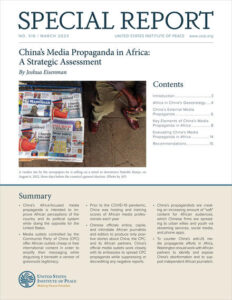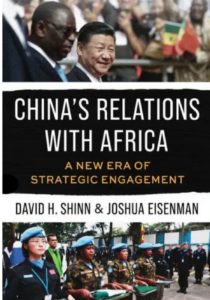 Working with African partners will help identify and expose China’s disinformation and untoward influence in the subcontinent, the University of Notre Dame’s Joshua Eisenman writes in China’s Media Propaganda in Africa: A Strategic Assessment, a new USIP report.
Working with African partners will help identify and expose China’s disinformation and untoward influence in the subcontinent, the University of Notre Dame’s Joshua Eisenman writes in China’s Media Propaganda in Africa: A Strategic Assessment, a new USIP report.
China’s Africa-focused media propaganda is intended to improve African perceptions of the country and its political system while doing the opposite for the United States, he notes, citing the International Republican Institute’s 2019 report on China’s Malign Influence and Anne-Marie Brady’s Journal of Democracy article, “Authoritarianism Goes Global (II): China’s Foreign Propaganda Machine,” among other sources:
• Media outlets controlled by the Communist Party of China (CPC) offer African outlets cheap or free international content in order to amplify their messaging while disguising it beneath a veneer of grassroots legitimacy.
• Prior to the COVID-19 pandemic, China was hosting and training scores of African media professionals each year.
• Chinese officials entice, cajole, and intimidate African journalists and editors to produce only positive stories about China, the CPC, and its African partners. China’s official media outlets work closely with its embassies to spread CPC propaganda while suppressing or discrediting any negative reports.
• China’s propagandists are creating an increasing amount of “soft”content for African audiences, which Chinese firms are spreading to urban elites and youth via streaming services, social media, and phone apps.
• To counter China’s anti-US media propaganda efforts in Africa, Washington should work with African partners to identify and expose China’s disinformation and to support independent journalism.
 China’s pressure on African journalists and editors to manipulate or conceal inconvenient facts can be clumsy and ham-fisted, adds Eisenman, co-author with Ambassador David H. Shinn of the forthcoming book, China’s Relations with Africa: A New Era of Strategic Engagement. When instances of these tactics have been revealed, there has often been a nationalist backlash that has empowered independent African voices.
China’s pressure on African journalists and editors to manipulate or conceal inconvenient facts can be clumsy and ham-fisted, adds Eisenman, co-author with Ambassador David H. Shinn of the forthcoming book, China’s Relations with Africa: A New Era of Strategic Engagement. When instances of these tactics have been revealed, there has often been a nationalist backlash that has empowered independent African voices.
US entities such as the National Endowment for Democracy (NED) can work with local partners, such as the independent fact-checking organization Africa Check, to identify false or misleading reports and to shine a spotlight when Chinese officials or their African collaborators suppress critical reporting, he suggests.







